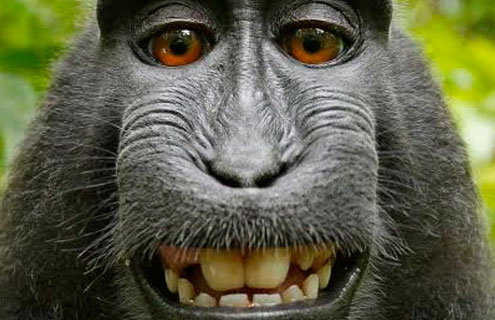Yoga poses are not copyrightable. Monkeys can maybe have copyright, if people who really care about them can take the case to court. We’ve got a termination decision from the Second Circuit, and oh, yeah, the Google Books project is fair use.
TGIF!

Bikram Choudhury, after extensive research about the best yoga poses for optimizing all the parts of the body, published a book in 1979 called Bikram’s Beginning Yoga Class, describing 26 very specific yoga poses to be done in sequence, in a room set at 105 degrees Fahrenheit, and two breathing exercises. Bikram marketed his yoga all over Hollywood (the birthplace of yoga), and in 1994 started offering “train the trainer workshops.” His students (rather unsurprisingly, it seems), began opening studios to teach his method. In 2011 Bikram filed suit claiming infringement of his copyright interest in the 26 pose “Sequence.” And last week, the Ninth Circuit Court of Appeals rather succinctly put an end to Bikram’s claims that had been interfering with the zen of hot yoga teachers across the country. “Simply put,” said the Court, “[Bikram’s] attempt is precluded by the idea/dichotomy expression, codified by Section 102(b) [of the U.S. Copyright Act].” Writing a book about medicine doesn’t give you exclusive rights to the medicine. Writing a book about yoga, or teaching it, or marketing it, doesn’t give Bikram ownership of the poses. Namaste.
We generally don’t like to talk about cases that are still ongoing, but the monkey selfie case is really too good to pass up.

Naruto, a six-year old Indonesian crested maraque, allegedly snapped his own photo with a wildlife photographer’s camera in 2011. The (human) photographer has had difficulty enforcing any rights, since it appears that he is not the “author” of the photos in question. The U.S. Copyright Office has refused to register the copyright on the basis that the author is not human, which probably shouldn’t even have to be a policy but is. (On the other hand, we have self-aware robots now….). The People for the Ethical Treatment of Animals has (as they do) decided that this is an OUTRAGE and that poor Naruto should have EQUAL RIGHTS. Never mind whether they can successfully convince a court that the monkey can have copyright (and if so, which treaties apply since he is, after all, a foreign monkey), but how exactly PETA has the right to bring the case at all, in other words, how they have standing. An interview with Jeffrey Kerr, general counsel of PETA, revealed their clever strategy: They would convince the judge that “they have [the monkey’s] best interest at heart” and this is how they would achieve standing to sue. Since the Copyright Act still says that only the “legal or beneficial owner” has standing, we will see if PETA’s moral outrage can win the day.
The Second Circuit earlier this week handed down a termination case giving the not-insignificant property “Santa Claus is Comin’ to Town” back to the heirs, who since 1951 have been riding the wave of ever-extending duration of copyright and new renewal terms, such that they now can enjoy the fruits of Coots’ work until 2023. And just in time for Christmas. Termination cases require some unpacking, so we’ll revisit this one next week.
And of course, just today the Second Circuit handed Google Books carte blanche to scan ALL THE BOOKS, as long as they are only allowing the public to use the text for data mining and search purposes and only showing scattered “snippets.” You can read my earlier posts here and here about the previous cases on this issue, and get a small sense of how I’m going to rant and rave about this opinion. But not ’til next week.
Have a great weekend, everyone.
Call Now To Get Started (615) 734-1188
[email protected]

